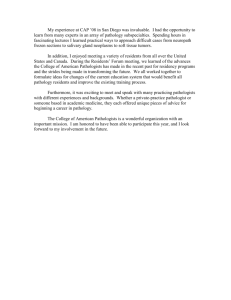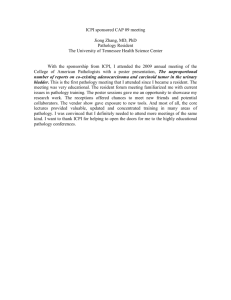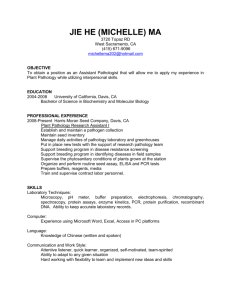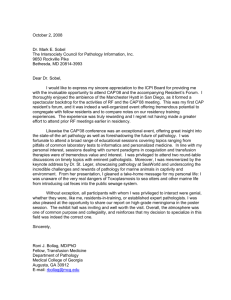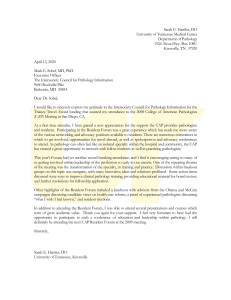Pathology
advertisement
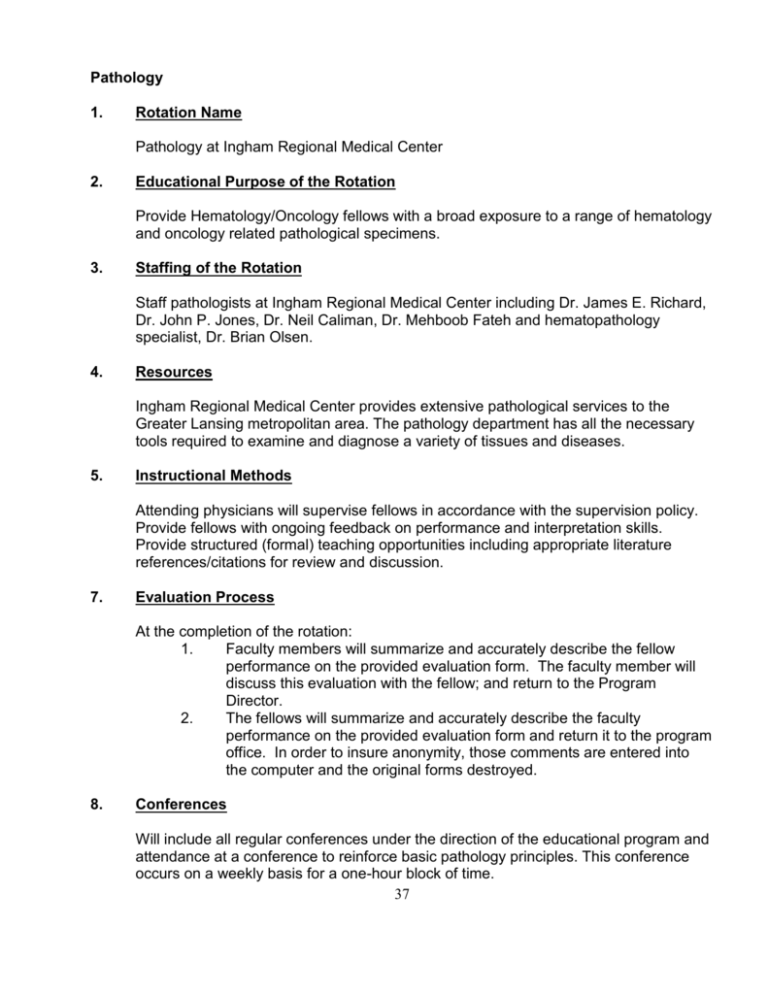
Pathology 1. Rotation Name Pathology at Ingham Regional Medical Center 2. Educational Purpose of the Rotation Provide Hematology/Oncology fellows with a broad exposure to a range of hematology and oncology related pathological specimens. 3. Staffing of the Rotation Staff pathologists at Ingham Regional Medical Center including Dr. James E. Richard, Dr. John P. Jones, Dr. Neil Caliman, Dr. Mehboob Fateh and hematopathology specialist, Dr. Brian Olsen. 4. Resources Ingham Regional Medical Center provides extensive pathological services to the Greater Lansing metropolitan area. The pathology department has all the necessary tools required to examine and diagnose a variety of tissues and diseases. 5. Instructional Methods Attending physicians will supervise fellows in accordance with the supervision policy. Provide fellows with ongoing feedback on performance and interpretation skills. Provide structured (formal) teaching opportunities including appropriate literature references/citations for review and discussion. 7. Evaluation Process At the completion of the rotation: 1. Faculty members will summarize and accurately describe the fellow performance on the provided evaluation form. The faculty member will discuss this evaluation with the fellow; and return to the Program Director. 2. The fellows will summarize and accurately describe the faculty performance on the provided evaluation form and return it to the program office. In order to insure anonymity, those comments are entered into the computer and the original forms destroyed. 8. Conferences Will include all regular conferences under the direction of the educational program and attendance at a conference to reinforce basic pathology principles. This conference occurs on a weekly basis for a one-hour block of time. 37 9. Schedule Monday AM PM Tuesday 7:30 Journal Club Pathology Pathology 12::15 Medicine Grand Rounds Pathology Pathology Wednesday 7:00 am – Tumor Board Sparrow Pathology Thursday Friday 7:00 am IRMC Tumor Board 7:30 Hem/Onc CoreConference Pathology Pathology Pathology Pathology All activities in bold are required activities for all sub-specialty residents. Residents continue to attend their outpatient hematology oncology clinic during their pathology rotation. 38 10. Pathology Rotation Competency Rotation Objectives: 1. Patient Care The resident will gain an increased understanding of criteria for different pathological diagnosis as well as criteria for pheresis. As the resident gains experience in pathological diagnosis they will gain a greater appreciation for how these diagnoses help to focus clinical evaluation and treatment. Experience in transfusion medicine to include blood typing which will provide a hands on approach. Experience in specialty coagulation laboratory with hands on experience in coagulation and platelet aggregometry. Experience with pheresis by observing patients beling pheresed. This will complement the fellows in hospital clinical experience where they learn clinical criteria for pheresis. 2. Medical Knowledge The resident will increase their knowledge base of pathology and criteria for diagnosis including morphological patterns, specific stains, karotyping and surface markers. In addition, the resident will learn about the pheresis procedure. Exposure to a broad range of histopathological malignancies including solid tumors, and hematopoetic cancers. This exposure includes tissue sections, cytology, bone marrow aspiration, biopsy and review of blood films. Gain experience with gross pathology dissection and measurement of tumors. Understand the critical components that should be present in a properly written pathology report. 3. Interpersonal and Communication Skills Residents will demonstrate appropriate communication skills with pathology attendings, staff and confirming physicians. 4. Professionalism Throughout the rotation, residents are expected to exhibit reliability in their duties as well as respect in their interactions with colleagues. 39 5. Practice Based Learning and Improvement a) Rotating residents will demonstrate self-initiative in the use of information technology available via the MSU electronic library to access and retrieve materials for self-education via computer terminals located in the resident offices and throughout the clinic. b) Rotating residents will be expected to show progressive learning throughout the rotation, with emphasis on learning from any cognitive or procedural errors. They are also expected to facilitate any quality improvement initiatives in place at Ingham Pathology Department. 6. Systems Based Practice a) All residents will demonstrate conscientious awareness of the impact of their professional activities at the Ingham Pathology Depatment, and will conscientiously avoid inappropriate use of the practice resources. b) Residents must demonstrate understanding of cost-effectiveness of care incorporating cost-effectiveness into their development of diagnosis and treatment plans. 40

